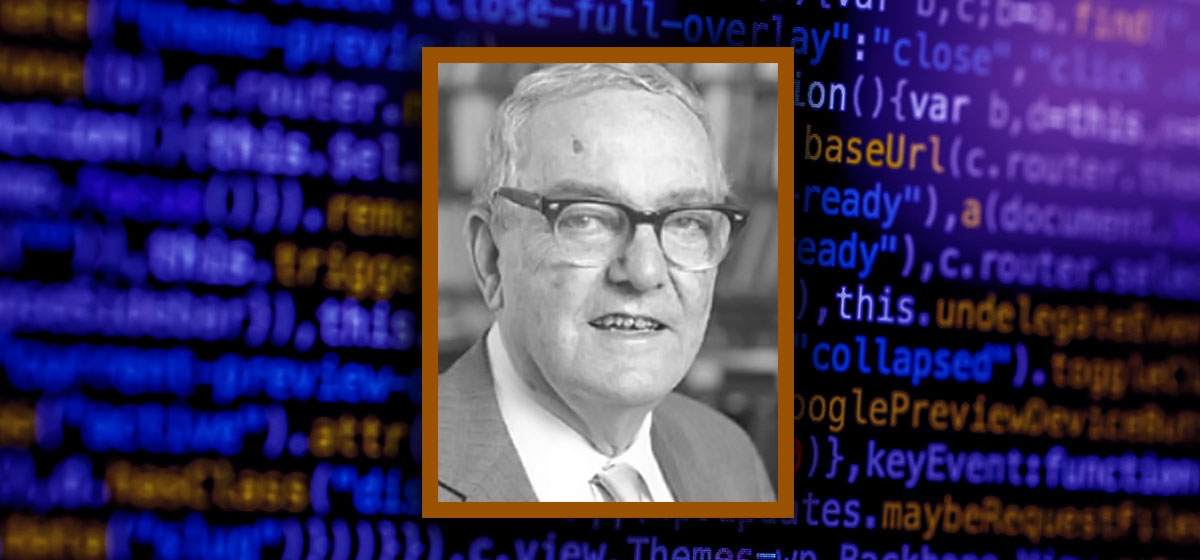Herbert Simon: 20th Century Galileo

James H. Morris is a retired professor of computer science and dean of the School of Computer Science as well as the Silicon Valley campus of Carnegie Mellon University. In a series of blogs for Pittsburgh Quarterly he writes about some of the computing pioneers he encountered during his career.
Although he was less approachable than Alan Perlis or Allen Newell, Herb Simon was a significant presence in my undergraduate education. He could often be found in one of the card-punching rooms, happily creating his own programs with us.
He gave beautifully clear and compelling lectures without notes or pictures. “How to be creative,” was the most memorable lecture of my undergraduate days. He described how Galileo seized a new tool, the microscope, to scan the heavens. He said that Newell and he were using computer programs, a new tool, to test psychological theories. He explained that chess grandmaster Bobby Fischer became so obsessed with chess that he had played more games by the age of 14 than anyone had ever played in a lifetime. Herb’s general approach to creativity was to deny importance of talent and focus on the particular behaviors that led to success. This led him to uncover relatively simple mechanisms that created interesting, even intelligent behavior.
It also fit perfectly with the Carnegie Institute of Technology motto, “My heart is in the work,” and the image of Pittsburgh. He seemed to be saying: Don’t fret about how smart you are. Just work long and hard. Decades before Malcolm Gladwell, Simon declared that one had to spend 10 years to become world-class at anything.
One of Simon’s other trenchant observations was that information was abundant while human attention was precious. He never read newspapers or magazines, let alone watch television. He certainly would have avoided the Internet. He said he depended on colleagues to inform him of any events worthy of his attention. In January, he might scan a dependable publication to review the events of the past year, in case he had missed anything.
The only conversation I had with Simon during my undergrad days ended with him saying, “Young man, you have Charles River fever.” He had been trying to persuade me to enroll in his new psychology Ph.D. program rather than attend the Massachusetts Institute of Technology. He and Newell were resentful of Harvard University and MIT’s preeminence and their “automatic presumption of greatness.” Newell once claimed that any professor who left Carnegie Mellon University became unproductive. Herb said my scientific career would be better if I stayed, and he was right. But I was anxious to extricate myself from Pittsburgh.
Upon arriving at MIT I found the building where all of its the U.S. Department of Defense Advanced Research Projects Agency money went. I searched for and found the famous artificial intelligence pioneer, Marvin Minsky, sitting in front of a big computer studying a spiral pattern on its display. I introduced myself and said I had come from Carnegie Tech. He barely looked up. Apparently the presumption of greatness was about him, not me. MIT has a chillier atmosphere than Carnegie Mellon.
Simon was combative about his ideas, especially artificial intelligence. He would berate any colleague who questioned his belief that machines could think. For several years he fought a war of dueling journal articles about one of his theories. In later years, at meetings of the computer science department, Herb would rail about the blindness of mathematicians. Mostly, he was dismayed that neoclassical economists had taken over his business school, ignoring his theory of bounded rationality.
At one of my first faculty meetings I suggested that we consider hiring a visiting professor working on my project. I said he was a reasonable guy. Simon thundered, “We don’t want reasonable people. We want people who disrupt and redirect their fields.” “Ok,” I said to myself, “the next time, I’ll say he walks on water in the presence of witnesses and deals lightening with both hands.”
Herb was all business—the business of science, that is—to the point of obtuseness. He began his eulogy to Allen Newell by saying, “Allen’s first priority was to do science, so I think that’s what I’ll do today.” He then launched into a lecture explaining some aspect of their theory of cognition. At a dinner party once, Simon heard a professor’s wife making casual small talk about some political issue that he deemed incorrect. He delivered a two-minute refutation of her observation causing an awkward silence.
We invited Herb and his wife to one of the occasional Sunday lunches we held for groups of the faculty. He appeared late remarking, “Dorthea is still at church, but I was at home working at the computer. I guess that is my god.”
At the memorial service honoring Herb after his death at 85, there were many speakers who he had hired and other who those people had hired, and so on. Simon had populated much of the university with brilliant, workaholic versions of himself. Over the course of 50 years, he had created a new university. It might never have happened if it weren’t for the charm of Northumberland Avenue. Let me explain:
Herb had come to Carnegie Tech in 1949 with other future Nobel Prize winners to start the business school. They pioneered the scientific approach to business. When Stanford University and MIT got wind of it, they raided the business school’s faculty. Only Simon stayed. I learned from Herb’s autobiography that one of his great pleasures was walking to campus from his modest house on Northumberland. He was a crusty Midwesterner, skeptical of the fame-seeking denizen’s of the coasts. He once he said, “I was never very famous, but famous scientists knew what I did.”
Simon’s impact on the world has been substantial. While Perlis had a 30-year goal of solving the programming bottleneck, Simon seems to have had a 100-year goal of recreating human intelligence with computers.
Someone once suggested that a statue of him should join those of Shakespeare, Michelangelo, Galileo and Bach in front of Pittsburgh’s Carnegie Institute. At the time, I considered this a bit over the top, but now I don’t. Artificial intelligence has gone from a conceit of science fiction to a reality, and finally to a challenge to humanity. Simon was not one to have misgivings about his creations, but I wonder what he would say today. Here is something he did say:
The definition of man’s uniqueness has always formed the kernel of his cosmological and ethical systems. With Copernicus and Galileo, he ceased to be the species located at the center of the universe, attended by sun and stars. With Darwin, he ceased to be the species created and specially endowed by God with soul and reason. With Freud, he ceased to be the species whose behavior was – potentially – governable by rational mind. As we begin to produce mechanisms that think and learn, he has ceased to be the species uniquely capable of complex, intelligent manipulation of his environment.
I am confident that man will, as he has in the past, find a new way of describing his place in the universe – a way that will satisfy his needs for dignity and for purpose. But it will be a way as different from the present one as was the Copernican from the Ptolemaic.
This phrase, “needs for dignity and purpose” haunts me today when unemployment, opioid addiction, and death stalk American men. Maybe these dudes should get over the dignity thing by changing a few diapers.
It is ironic that Carnegie Mellon, whose motto is “My heart is in the work,” is working so feverishly on artificial intelligence to eliminate work. A few of our colleagues, Seth Goldstein, Mark Kamlet, and Illah Nourbakhsh along with some in the Human-Computer Interaction Institute have approached Simon’s challenge to design the human future.





